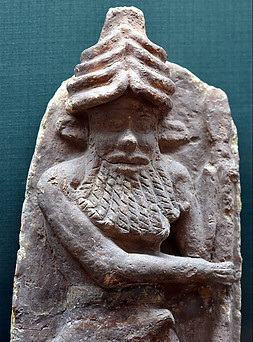

Enkidu by Osama Shukir Muhammed Amin FRCP(Glasg) – Own work, CC BY-SA 4.0, https://commons.wikimedia.org/w/index.php?curid=90610606
Epic Theme
One of my favorite themes is Civilization vs Nature and luckily for me, it is very present in this ancient masterpiece. Why do I love it? Look at the effects the pandemic of COVID has had on our planet. The polluted skies have cleared, animals roam the temporarily uninhabited streets, and I gleefully inhale the actually fresh air whenever I step outside or go for a run. This by itself isn’t the conflict of nature and civilization, but the peak of nature I just alluded to exposes the grim juxtaposition civilization can sometimes produce. Overcrowded streets and transportation systems, zombie-like walkers in human form staring at a small screen and making ugly comments on their social media, people in perpetual conflict and anxiety, rushing off to either fight for a cause or keep up in a rat race akin to a hamster wheel.
Contrast this with the harmony and simplicity of nature, where predator and prey support an awe-inspiring and intricate ecosystem filled with the wonder of creation, growth, and beauty. Where everything, from the largest, tallest tree, to the smallest and unassuming insect has an important purpose and interweaves with the existence of everything else.
Sure, it seems as if I have chosen which side of the debate I belong on, but civilization has its ardent protectors as well, and this wonderful theme plays out incredibly in this wonderful masterpiece of an epic.
The Creation of Enkidu
Here’s a little mini-summary of the plot in order to understand how this theme plays out. Gilgamesh, at the beginning of the epic is an arrogant, tyrannical and despotic king. He takes his citizens’ sons and uses them for battle in needless wars; his lust is insatiable and he sleeps with the wives of his citizens and in this case does not discriminate between the nobles and the lower classes. Anu, the king of the Sumerian gods hear the laments of the citizens of Uruk and decides on creating an equal to Gilgamesh, capable of challenging him and thereby occupying Gilgamesh enough to leave Uruk in peace. He asks Aruru, the goddess of creation to make Enkidu, a man equal in stature and strength to the mighty Gilgamesh. Enkidu is dropped off in the wilderness and described thusly:
There was virtue in him of the god of war, of Ninurta himself. His body was rough, he had long hair like a woman’s; it waved like the hair of Nisaba, the goddess of corn. His body was covered with matter hair like Samuqan’s, the god of cattle. He was innocent of mankind; he knew nothing of the cultivated land. (Tablet 1)
So, this walking image of the gods spends his first days on hills with gazelles, eating grass, and drinking water out of lakes huddled among all the beasts of nature. He lives as one of them until he is discovered by a young hunter at the lake. The hunter is terrified and realizes that Enkidu has been releasing animals from the hunter’s traps. He returns home and tells his father, who (being a wise and unperturbed man) tells him to go to Uruk, tell Gilgamesh about the might of this savage, and to ask him for a harlot to return with him in order to “let her woman’s power overpower this man” (Tablet 1). The hunter’s father knows that after Enkidu sleeps with a harlot, the wild beasts will reject him. The hunter does as he is told and returns home with the harlot named Shamhat.
They go to the plains together, and Shamhat lures Enkidu using her womanly wiles and they sleep together for six days and seven nights. After his lust is sated. Enkidu returns to the wild. When the gazelles and other wild animals see him, they flee. Enkidu attempts to follow them, but “his body was bound as though with a cord, his knees gave way when he started to run, his swiftness was gone. And now the wild creatures had all fled away; Enkidu was grown weak, for wisdom was in him, and the thoughts of a man were in his heart” (Tablet 1).
Saddened, Enkidu returns to Shamhat, who comforts him and tells him that she will take him to Uruk to see the great-walled city inhabited by Gilgamesh. Enkidu lightens up and swells up with joy at the prospect of challenging Gilgamesh.
Key Takeaways
Notice how this part of the story describes the change in Enkidu. The beasts run away from him because “wisdom was in him.” He is unable to go back to his old way of life because he has laid with a woman. But surely, it isn’t just the sex that makes Enkidu unable to roam with the beasts, for “the thoughts of a man were in his heart.” If you are unaccustomed to the style of this ancient text, the change in Enkidu will seem to be abrupt and unexplained, but it is up to us, the readers, to excavate the greater meaning of this occurrence. Keep in mind, that Enkidu is still powerful and fast, more god than man, yet his inability to keep up with the beasts isn’t necessarily physical, but rather psychological. It is his understanding that has expanded and thereby taken his innocence. Remember, after his creation, he is described as being “innocent of mankind,” and this innocence is taken two-fold, by the loss of his virginity, and by the introduction into the world of man by Shamhat. She acts as his instructor, and prepares him for his journey ahead and what he will encounter. She is a very important aspect of the story, and I want to delve more into her character in later analyses.
What does this tell us? That nature is associated with innocence, simplicity, purity and an uncultivated land. It is this innocence that mankind sometimes yearns for and sees solace in. Civilization is something else entirely, and while this story is respects nature, it sees civilization as the next, necessary step in progression. It is my theory that the Sumerians didn’t see nature as in conflict with civilization, but rather as the first step leading towards it.
My next article will explore friendship in The Epic of Gilgamesh.
Author: Kristap Baltin
Homepage: Kristapbaltin.com
